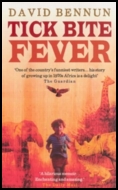|
Available now from Ebury Press:
British As A Second Language More details here Click here to buy it Also published by Ebury: Dave's highly acclaimed African memoir Tick Bite Fever |
This page is part of David Bennun's online journalism archive. Main Index
| Morrissey [The Mail On Sunday, 2004] MORRISSEY BRIGHTON CENTRE **** SELF-IMPOSED EXILE in Los Angeles, and an enforced absence from the record business, have imbued Morrissey with a Norma Desmond quality in the public imagination (“I am big. It's the music that got small.”) When last we heard from him seven years ago, he was turning out waspish, weak material that revealed a writer bereft of ideas and consumed by resentment. 2004's comeback album, You Are the Quarry, although a big improvement, was far from being the marvel many acclaimed it. The suspicion is they were just pleased to see him again. I've been an occasional admirer rather than a passionate fan of the singer who, perhaps more than any other, inspires passionate fandom. But even I could not bear the prospect of Morrissey making a pitiful, perhaps desperate spectacle of himself. As it turns out, that would be too pat. Morrissey may have assembled a personal iconography of sad or embittered eccentrics over the years, but he is evidently in no hurry to undergo a public investiture into their ranks. It really is a relief to watch what begins as a confident and vigorous display, and concludes in triumph. If you think my fears a touch melodramatic, bear in mind we're dealing with a performer for whom melodrama is one step removed from breathing. The very English theatricality that characterises most of his work was dispelled on Quarry. It suggested he had - like fellow Brits Billy Connolly and Dudley Moore before him -gone native in LA. His once arch and enigmatic lyrics were replaced by angry tirades, alternating with what at times sounded disquietingly like psychobabble. His live show, however, allows for no messing about. The huge, Elvis '68-style illumination of his name highlights the message, in case anyone missed it. A star is returning to claim what's rightfully his. Morrissey is in excellent voice, and on fighting form. He's even started to resemble an old school boxer - his weatherbeaten, half-moon face would now, in monochrome, look more appropriate than ever on a Smiths sleeve. To hear the shuddering chords of How Soon Is Now break across the auditorium is as startling as it's rousing. The Morrissey of old would not have deigned to play Smiths tunes, let alone open with one - the most emphatic and unmistakable one, at that. I'm guessing he's seen enough of the wilderness; he's leaving nothing to chance. He's also dressed as a priest. I can't imagine who in this most secular of nations might be shocked or titillated by this. Maybe that's not the point, although I wouldn't care to say what is. The dog collar is inconsequential, anyway. For a performance like this, he could be got up like a frogman and you wouldn't notice after a minute or two. Songs which seemed anaemic on Quarry sound rugged tonight, while that album's best numbers roar along. Once, Morrissey had the knack of creating titles so good they hardly needed a song; later, he started to write songs that made you wish he'd stopped with the title. On record, The World Is Full Of Crashing Bores comes dangerously close to proving its own assertion. Here, it simmers with outrage, and ends - as if to hammer home the point - with the crash of a giant gong. Irish Blood, English Heart, the album's finest track, is almost overpowering. It stands in notable contrast to the songs (unplayed here) that in the early 90s saw Morrissey accused of abetting the racist right. These are nowadays dismissed as a “flirtation” with fascist imagery, but they were too ambiguous and unsettling for so simple or indulgent an interpretation. Whatever lay behind them, the change in tone is unmistakable. It's not incumbent on any artist to pledge allegiance to a political stance; but if you elect to do so, you may as well pledge it as unequivocally as this. The same openness distinguishes the recent b-side, Munich Air Disaster 1958, a loving, poignant tribute to the lost Busby Babes. So direct and heartfelt are these songs, and so forcefully does Morrissey sing them, that you can find yourself taken aback to hear them between such sidewise favourites as November Spawned a Monster and The More You Ignore Me, The Closer I Get. Smiths hits are seeded through the set, too. Perhaps, for the first time in a long time, Morrissey feels that he has something to prove. If adulation breeds complacency - and Morrissey's later solo albums indicate that it may - then those years without a record deal have shaken him out of it. Shoplifters Of The World Unite and There Is A Light That Never Goes Out are greeted like homecoming heroes. The closing rendition of Last Night I Dreamt That Somebody Loved Me serves as a reminder of why so many people are obsessed with this man. And why he still warrants it. All material on this site is copyrighted © to David Bennun and may not be reprinted or reused without permission, if you'll pardon the southpaw grammar. Back to Music Reviews
Back to Pop |
| Text to separate 1 |  | Text to separate |  |
| Text to separate 1 | Tick Bite Fever | Text to separate | British As A Second Language |